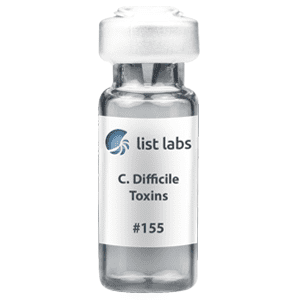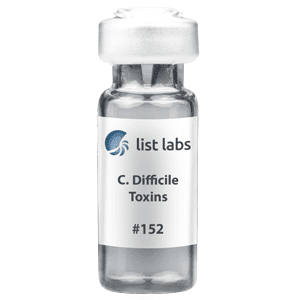Clostridium difficile Toxins
Clostridium difficile is the causative agent of antibiotic-associated diarrhea and pseudomembranous colitis. It produces two major toxins, Toxin A and Toxin B. Both Toxin A and Toxin B deactivate small GTPases such as Rho, Rac and Cdc42 by glucosylation of a threonine residue. Inhibition of these GTPases causes the shutdown of signal transduction cascades leading to depolymerization of the cytoskeleton, gene transcription of certain stress-activated protein kinases, a drop in synthesis of phosphatidylinositol 4,5 bisphosphate and possible loss of cell polarity. Loss of cytoskeletal structure results in cell rounding. Some strains of C. difficile also produce a binary ADP-ribosylating toxin (CDT) which modifies actin.
Toxin A
Toxin A from C. difficile, referred to as an enterotoxin, has a molecular weight of 300 kDa and an isoelectric point, pl, of 5.3. Toxin A has been shown to have a binding site on epithelial cell surface carbohydrates and causes induction of interleukin 8. C. difficile Toxin A offered by List is highly purified from the native strain.
- Product #152 Toxin A from C. difficile is provided lyophilized in a Tris buffer. It is highly recommended to test a range of toxin concentrations for cytotoxicity, as each cell type exhibits different sensitivity to Toxin A.
Toxin B
Toxin B from C. difficile, known as a cytotoxin, has a molecular weight of 270 kDa and a pl of 4.1. Toxin B is a potent cytotoxin for mammalian cells in tissue culture and is at least 1,000 times more cytotoxic than Toxin A in cell rounding assays. Toxin B may block serotonin release, as well as stimulate production of phospholipases C and D. By virtue of its ability to affect depolymerization of the cytoskeleton, Toxin B has been shown to inhibit biphasic muscle contraction.
Toxin B is highly cytotoxic and the most sensitive detection of this toxin is an epithelial cell toxicity assay. Cell based assays are important in determining the cause of the diarrheal disease in hospitalized patients. These Toxin Neutralization Assays (TNA) are made quite accurate with specific antibodies. C. difficile toxin B is determined to be present in a patient if mixing a specific anti-Toxin B antibody with a stool sample protects cell culture from the toxic effects occurring without the antibody. The List Labs’ Chicken Anti-C. difficile toxin B antibody has been demonstrated to be useful in these TNA cell-based assays. C. difficile Toxin B provided by List is highly purified from the native strain and offered as a liquid.
- Product #155L Toxin B from C. difficile, liquid, is provided in a Tris buffer solution. This toxin solution is ready to use and more convenient for some applications. Again, it is important to test a range of toxin concentrations for cytotoxicity, as each cell type exhibits different sensitivity to Toxin B.
Toxoids
Toxoids of both Clostridium difficile Toxin A and Toxin B are prepared from purified toxin by formaldehyde inactivation. All preparations are tested for cytotoxicity, and results are in a C of A that is provided with every shipment.
- Product #153 Toxin A Toxoid from C. difficile is provided lyophilized in a histidine buffer.
- Product #154 Toxin B Toxoid from C. difficile is provided lyophilized in a histidine buffer.
Glutamate Dehydrogenase (cdGDH)
Glutamate dehydrogenase (cdGDH) is a major antigen produced by native strains of C. difficile. For diagnosis early in an infection, cdGDH is more readily detected by ELISA than Toxin A or Toxin B and is a viable candidate for use in developing test kits. List Labs also provides the chicken anti-cdGDH antibody, Product #756. Glutamate dehydrogenase from C. difficile provided by List is highly purified from the native strain and offered as a liquid.
- Product #159 Glutamate Dehydrogenase from C. difficile is provided lyophilized in D-PBS buffer.
Antibodies
List Labs offers several antibodies generated to C. difficile products, including goat antisera to C. difficile Toxin A as well as affinity purified chicken lgY to both C. difficile Toxin A and Toxin B. Affinity purified chicken IgY against C. difficile GDH and C. difficile Binary Toxin A are also provided. The Anti-C. difficile Binary Toxin B chicken IgY is available both with and without biotinylation. Antibodies to the Binary Toxin B subunit can be used to capture and detect the binary toxin. Antibodies to C. difficile products can be used for Western Blots, ELISAs, and sandwich ELISAs. These products may be applicable for diagnostics and are of considerable interest in infectious disease research.
- Product #752 Anti-C. difficile Toxin A goat antisera is provided as a lyophilized powder.
- Product #753 Anti-C. difficile Toxin A affinity purified chicken IgY is provided as a liquid in PBS buffer.
- Product #754 Anti-C. difficile Toxin B affinity purified chicken IgY is provided as a liquid in PBS buffer.
- Product #756 Anti-C. difficile Glutamate Dehydrogenase affinity purified chicken IgY is provided as a liquid in PBS buffer.
- Product #757 Anti-C. difficile Binary Toxin A subunit affinity purified chicken IgY is provided as a liquid in PBS buffer.
- Product #758 Anti-C. difficile Binary Toxin B subunit affinity purified chicken IgY is provided as a liquid in PBS buffer.
- Product #759 Anti-C. difficile Binary Toxin B subunit Chicken IgY, Biotinylated, is provided as a liquid in PBS buffer.




